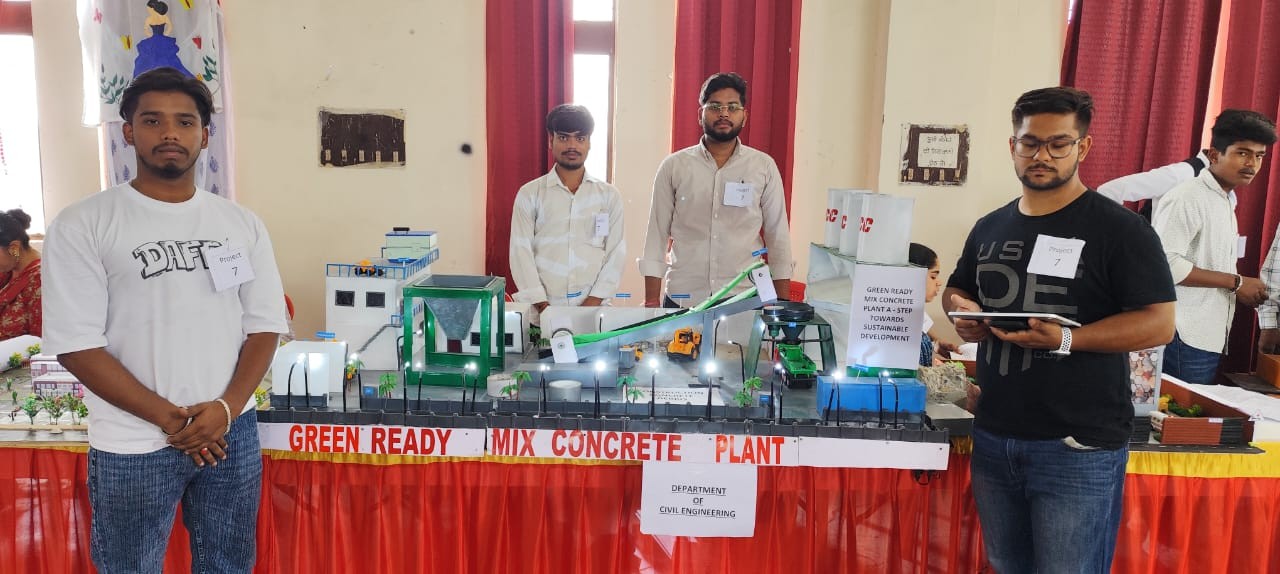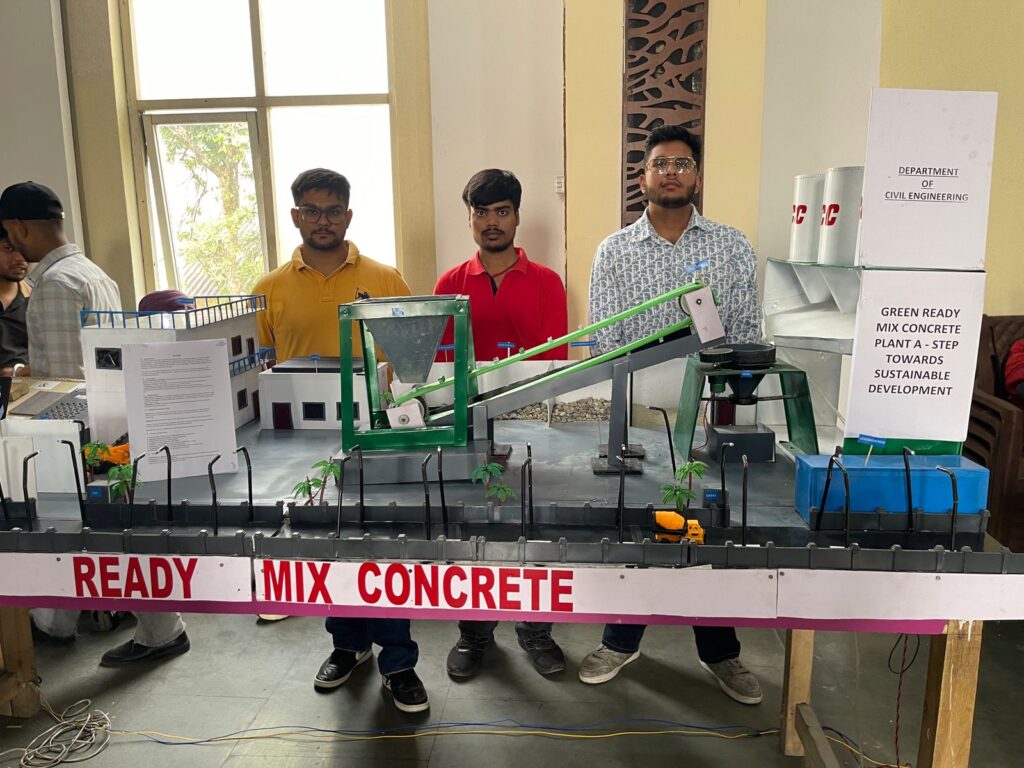GREEN READY-MIX CONCRETE (RMC) PLANT
A STEP TOWARDS SUSTAINABLE DEVELOPMENT
Article by; Er. Vaibhav Bansal (B.Tech, LLB TYC (P)
Bureau Chief
In India, the rapid pace of urbanization, combined with the growing demand for modern infrastructure, is resulting in enormous quantities of construction and demolition (C&D) waste. Simultaneously, the extraction of natural aggregates continues to pose severe environmental and ecological threats. In this context, the present study proposes an innovative and sustainable approach — the design and operation of a Green Ready-Mix Concrete (RMC) Plant that utilizes recycled aggregates (RA) from construction concrete debris (CCD) and fly ash as partial replacements in concrete production.
This initiative, conducted by final-year civil engineering students at Mehr Chand Polytechnic College, Jalandhar, aims to reduce the carbon footprint of the construction industry while supporting the Sustainable Development Goals (SDGs) and Indian regulatory frameworks that promote the use of green construction materials.

- Introduction
The construction industry is among the largest contributors to environmental degradation through:
- Depletion of natural resources (stone, sand, gravel).
- Generation of vast quantities of C&D waste.
- High carbon emissions during cement and concrete production.
According to the Central Pollution Control Board (CPCB), India produces approximately 150 million tonnes of C&D waste annually, out of which only a fraction is effectively recycled. Given the scarcity and rising cost of natural aggregates, recycled concrete aggregates (RCA) offer a sustainable and economically viable alternative.
- Objective of the Project
This project set out to:
- Analyze the feasibility of incorporating recycled aggregates and fly ash into Ready-Mix Concrete (RMC).
- Evaluate the physical and mechanical properties of such “Green Concrete”.
- Support the establishment of Green RMC Plants to promote circular construction practices.
- Align with Indian standards and government regulations related to sustainable infrastructure.
- Methodology
3.1 Material Collection & Processing
- Recycled Aggregates (RA): Derived from crushed concrete debris collected from demolition sites, processed to remove impurities and sized per IS specifications.
- Fly Ash: Industrial by-product from thermal power plants, used as a pozzolanic material in concrete.
3.2 Testing Protocols
All testing was carried out in accordance with IS: 383 (2016), IS: 456 (2000), and IS: 2386 (Part I to VIII), which define the quality parameters for aggregates and concrete.
Tests included:
- Sieve analysis
- Water absorption
- Specific gravity
- Aggregate crushing value
- Workability and compressive strength of concrete with RA
- Observations & Results
The test results indicate that:
- Workability of concrete with 20–30% recycled aggregates is comparable to conventional mixes when properly graded.
- Compressive strength values were within permissible limits, especially when fly ash was used as a partial cement replacement.
- Water absorption of RA was higher than natural aggregates but manageable with adjusted water-cement ratios.
- Environmental impact significantly reduced due to the reuse of waste materials.
The results confirmed that a carefully proportioned mix using recycled aggregates and fly ash can effectively produce Green RMC with mechanical properties suitable for non-structural and moderate-load applications such as pavements, footpaths, compound walls, parking slabs, and low-rise buildings.
- Legal & Regulatory Framework in India
The initiative aligns with multiple national-level sustainability and environmental directives:
5.1 Construction and Demolition Waste Management Rules, 2016
- Mandate the reuse and recycling of C&D waste.
- Require cities with over 1 million population to establish recycling facilities.
- Support public procurement of products made with recycled materials.
5.2 Fly Ash Notification (MoEFCC, 1999, amended in 2016)
- Encourages use of fly ash in construction within a 300 km radius of coal-based power plants.
5.3 Indian Road Congress (IRC) Guidelines
- IRC: 121-2017 provides specifications for using recycled aggregates in base and sub-base courses.
5.4 BIS Standards
- IS: 383-2016 allows for use of recycled aggregates in concrete with appropriate quality checks.
This legal landscape provides robust support for Green RMC practices and encourages institutional and contractor-level adoption.
- Environmental and Economic Benefits
| Parameter | Traditional RMC | Green RMC |
| Natural Aggregate Usage | 100% | Reduced up to 30–40% |
| Fly Ash Usage | Minimal or none | 15–25% replacement of cement possible |
| C&D Waste Generation | Contributes to landfill | Mitigates landfill pressure |
| Carbon Footprint | High | Moderate to low |
| Cost of Production | High (due to raw material cost) | Lower (due to use of industrial waste) |
- Recommendations
- Pilot Green RMC plants should be installed near urban centers to facilitate efficient recycling.
- Public infrastructure tenders should mandate a percentage of recycled materials.
- Engineering institutions must include practical training in recycled material technology.
- Policy-makers should offer tax and procurement incentives for green concrete adoption.
The successful execution of this project demonstrates the technical feasibility, legal support, and environmental necessity of adopting Green Ready-Mix Concrete using recycled aggregates and fly ash. This aligns with India’s circular economy goals and the UN’s Sustainable Development Goals (SDG 11: Sustainable Cities and Communities, SDG 12: Responsible Consumption and Production).
The project further reinforces the role of young engineers and academia in pioneering innovative, eco-conscious construction practices, offering replicable models for real-world applications.
Prepared by:
- Sanjeev Chandra, Pardeep, Suryapratap, Paras Sachdeva, Sunny
Final Year Students, Civil Engineering Department
Mehr Chand Polytechnic College, Jalandhar
Guided by:
- Er. Rajesh Kumar (Lecturer), Er. Kanav Mahajan (Lecturer)
Department of Civil Engineering
Mehr Chand Polytechnic College, Jalandhar
Keywords:
Recycled Aggregates, Fly Ash, Green Concrete, Ready-Mix Concrete, Sustainable Construction, C&D Waste, MoEFCC, IS 383, Indian Construction Law

